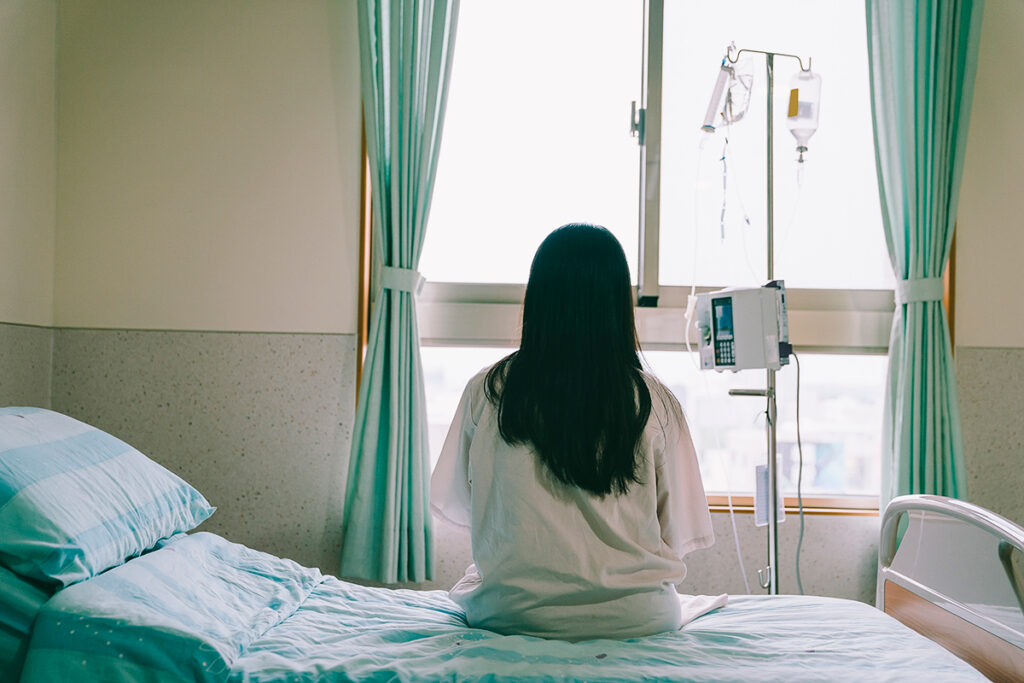A hallmark of severe COVID-19 is uncontrolled systemic inflammation due to an overactive immune system. To reduce deaths from severe COVID-19, doctors prescribe glucocorticoids (GCs), drugs that suppress the immune system and reduce inflammation.
Clinical studies confirm the effectiveness of GC in COVID-19:
- High doses of methylprednisolone accelerated clinical improvement and reduced mortality in cytokine storm syndrome.
- Systemic GCs were associated with a lower 28-day all-cause mortality among critically ill COVID-19 patients.
However, high doses of glucocorticoids cause severe side effects. Among them is the necrosis of the bone site. Also, GC suppresses innate antiviral immunity. That leads to a delay in eliminating the virus and poor outcomes in various viral pneumonia.
An essential component of antiviral immunity is interferon signaling (IFN), limiting the virus’s multiplication and spread. In mice studies, scientists have shown that GC suppresses the interferon response to viral lung infections. However, the antiviral response is restored with interferon treatment.
The peculiarity of the SARS-CoV-2 coronavirus is that it suppresses the interferon system. In severe COVID-19, the level of IFN in the peripheral blood and lungs is reduced. Interferon has been successfully used in combination therapy for early COVID-19. However, in the later stages, interferon treatment aggravates the disease. Therefore, to choose the right time for interferon treatment, it is vital to determine the set of COVID-19 in advance.
Study: Interferon and Glucocorticoids Combine Against COVID-19
Since glucocorticoids suppress the interferon system, Chinese scientists have suggested that in the treatment of COVID-19, interferon in conjunction with glucocorticoids can compensate for the loss of antiviral immunity caused by GC.
Scientists analyzed data from 387 patients with COVID-19:
- 118 (30.5%) received GC and early treatment with inhaled IFN (6-11 days after the onset of symptoms);
- 95 (24.5%) received only GC;
- 87 (22.5%) received only early treatment with inhaled IFN;
- 87 (22.5%) did not receive any of these drugs.
Research Results
Neither GC Nor IFN Used Stand Alone Was Associated With Recovery From COVID-19
Patients who received GC recovered more slowly than those who did not receive GC. Prolonged virus shedding was observed in the GC group and those who did not receive GC.
Early treatment of IFN was associated with earlier discharge and relief of symptoms. Prolonged isolation of the virus was less frequently observed among patients receiving early IFN.
However, these differences were no longer significant after adjustments were made for factors that affect symptom relief and hospital discharge.
Early IFN Treatment Was Associated With Earlier Recovery in Those Receiving GC
Patients who received early treatment with interferon in conjunction with glucocorticoids were previously discharged from the hospital. However, this was not observed among patients who did not receive GC.
Similarly, early IFN therapy was associated with rapid symptom relief only in GC patients. Moreover, early IFN therapy was associated with a lower prevalence of long-term viral shedding among those receiving GC. However, a slight but opposite trend was observed in those who did not receive GC.
Mathematical modeling has shown a consistent interaction between GC and early IFN therapy in assessing hospital stay and time to symptom relief. These data provide evidence of synergy between GC and IFN in COVID-19.
Early Interferon Therapy May Reduce GC’s Negative Effects on COVID-19 Recovery
GC has been associated with delayed discharge and symptom relief. However, these effects were reversed by early IFN therapy.
Without IFN, prolonged virus shedding was observed in those who received GCs three times more often than those who did not receive GCs. However, early treatment with IFN changed the situation: prolonged isolation of the virus in those who received GC was observed less frequently than in those who did not receive GC.
Early Co-Administration of GC And IFN Increased Synergy
When GC and IFN were co-administered at an early stage of COVID-19, the hospital stay was shorter than when GC alone was administered without IFN. However, early IFN therapy was not associated with hospital discharge in those who took GC later.
Early administration of GC and IFN was also associated with earlier symptom relief than with GC alone without IFN. With late GC administration, interferon did not produce such an effect.
The prevalence of prolonged viral shedding was lower in patients with early IFN therapy with both early and late GC administration.
The synergy of GC and IFN depended on the GC dose.
The synergy of GC and IFN is time-dependent, and the administration of GC and IFN simultaneously in the early stages of COVID-19 is associated with faster recovery.
Conclusion
Even in the presence of glucocorticoids, inhaled interferon effectively restores antiviral immunity. Early administration of glucocorticoids and interferon speeds up hospital discharge, symptom relief, and virus clearance.
Useful article, necessary information? Share it!
Someone will also find it useful and necessary:
Reference
Clinical evidence of an interferon – glucocorticoid therapeutic synergy in COVID-19



